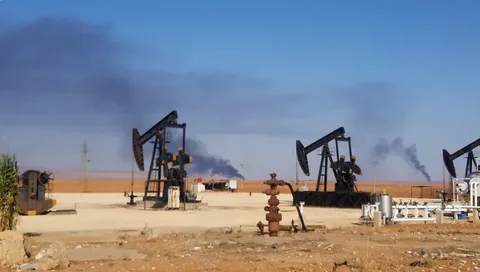Drone strikes on Iraqi oilfields have drastically reduced crude oil production in the semi-autonomous Kurdistan region, cutting output by nearly 150,000 barrels per day (bpd). Officials report that, before the strikes, the region produced approximately 285,000 barrels per day. Multiple oilfields have shut down due to significant infrastructure damage, triggering concerns over regional stability and energy supply. The Attack on the Iraqi Kurdistan oilfields comes amid rising tensions between Erbil and Baghdad, as well as speculation over the involvement of pro-Iran militias.

The Drone strikes on Iraqi oilfields began earlier this week and have targeted key sites including the Sarsang, Shaikan, Tawke, Peshkabour, Ain Sifni, and Khurmala oilfields. The Attack on Iraq’s oilfields forced shutdowns that threaten not only output but also the safety of workers in these facilities. Gulf Keystone Petroleum, which operates the Shaikan field, confirmed it had halted production as a safety measure.
Drone Strikes on Iraqi Oilfields: U.S. Companies Impacted, Kurdistan Government Responds
Drone strikes on Iraqi oilfields have disrupted operations involving U.S. energy firms, including Gulf Keystone and Hunt Oil, deepening geopolitical friction in the region. The Kurdistan Regional Government (KRG) has labelled the attacks acts of terrorism, targeting vital economic infrastructure. Following the Attack on the Iraqi Kurdistan oilfields, Norwegian operator DNO also suspended operations at the Tawke and Peshkabour fields, although the company reported no injuries. APIKUR, a coalition of eight oil firms in the region, said most of its members have now paused production.
The Drone strikes on Iraqi oilfields are seen by analysts as a deliberate effort to weaken the Kurdish government’s financial position and complicate its ties with U.S. companies. One drone attack on the Sarsang oilfield occurred just hours before its U.S. operator signed a new deal with Iraq’s federal government. The incident fits a broader pattern of attacks on Iraq’s oilfields that are increasingly linked to Iranian influence.
Drone Strikes on Iraqi Oilfields Intensify Regional Tensions Between Erbil, Baghdad, and Iran
Drone strikes on Iraqi oilfields come amid long-standing disputes between the Kurdistan region and Iraq’s federal government over oil rights, exports, and foreign partnerships. The latest wave of attacks coincides with Baghdad’s legal action against KRG for signing contracts with U.S. companies without federal oversight. The strikes—especially the Iraq Kurdistan oilfields Attack—highlight the fragility of Iraq’s energy infrastructure and deepen the Erbil-Baghdad divide.
The Drone strikes on Iraqi oilfields are part of a broader escalation that includes attacks near Erbil airport and repeated assaults on Khurmala and other strategic sites. The United States has condemned the attacks as “unacceptable” and urged Iraq’s federal government to stop armed groups from launching such assaults.








